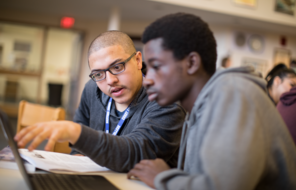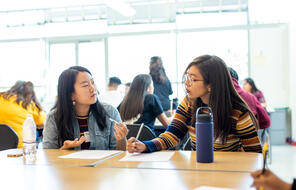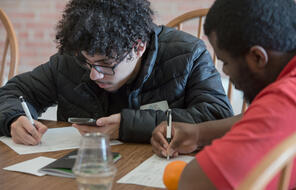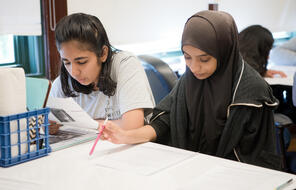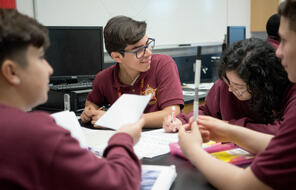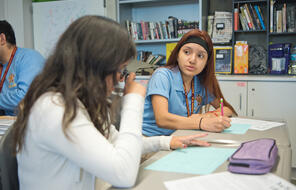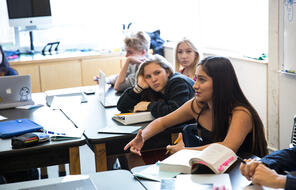"The Worlds I See" by Dr. Fei-Fei Li
Subject
- English & Language Arts
Language
English — USUpdated
Get it in Google Drive!
Get everything you need including content from this page
Get it in Google Drive!
Get everything you need including content from this page
"The Worlds I See"
by Dr. Fei-Fei Li
“You know, there are a lot of smart kids in this class.”
Mr. Sabella had a reputation for sternness, made instantly Manifest .
My junior year in high school was also my second year in America, and its arrival was accompanied by a renewed energy to prove myself in math and physics. It was a natural instinct; grades are a well-established target for immigrants desperate to secure some hope of a future worth wanting. But for me, what had begun as a way to rehabilitate my self-esteem was fast becoming an overcorrection. The instability that undergirded my life outside school was turning the simple goal of scholastic success into a fixation.
I’d just taken my first math test of the year, and although I retained some confidence in my ability to solve the purely numeric portion, there were word problems as well, and I wasn’t as sure of my interpretation of the text. I could feel the blood pumping in my ears as the papers were passed back. I held my breath as I turned mine over, hoping I’d at least stayed within the 90 percent range of an A-minus. I stared momentarily at the score before sinking into my seat. 89.4.
Frustrated, I took my place among a clutch of students hovering around Mr. Sabella’s desk after class. I wasn’t looking for favors—even then I knew that rounding up a score for my ego’s sake wouldn’t change anything—but I’d hope some opportunity for extra credit might exist. The threshold between A’s and all other grades had taken on religious gravity for me, and I just wanted a chance to push myself above it. Unfortunately for me, Mr. Sabella was in no mood to offer indulgences that day.
I left the room dissatisfied, but my interpretation softened as I replayed his words in my head over the course of the afternoon. Whereas teachers in Chengdu seemed to want little more than for me to blend in, I began to sense Mr. Sabella was challenging me in different way. He wanted me to stand out. No one owes you anything, he seemed to be saying. If you want an A so badly, you can work harder for it next time. I can’t pretend I was ready to receive that kind of wisdom, but I had to acknowledge, reluctantly, that there was probably something to it.
Mr. Sabella was no ordinary teacher. He held the most advanced degrees in the department, earning him a dedicated office and the title of head math instructor. And he was a true Connoisseur of the discipline, with a sprawling collection of textbooks and reference volumes that created a rainbow of colored spines facing outward from every wall. Like many of his students, I began visiting his office after school, asking questions and getting a head start on homework. It soon became a daily habit.
Unofficially christened the math lab, the office became a refuge. As days became weeks and weeks became months, his tutoring helped compensate for the obstacle of having to juggle math while decrypting a new language at the same time. And with the library assault still replaying in my head on occasion, it was a place in which I truly felt safe. It was also a chance to rediscover the simple joy of conversation, a luxury in short supply as a nerdy immigrant teenager.
Ironically, being an ESL student made it easy for me to speak up. I continued to need so many words and English-language concepts explained that isolated questions became an ongoing dialogue. The more we spoke, the more I realized that he wasn't anything like the teacher I'd overheard dismissing the intellectual capabilities of girls back in China or discouraging restaurant boss who’d all but mocked my love for reading. He could be terse and abrasive, but he never wrote me off the way others had. He was challenging me, and it was working.
We also had much more in common than a love for numbers. On the way out of his class one day, I asked what I thought was a simple question:
“Mr. Sabella, can you recommend some books for me?”
“You mean math books?”
“No, any kind. Reading helps my English.”
I could tell he was pleased by the request. Mr. Sabella was the kind of guy who had a lot to say when given the green light and he thought for a moment then smiled.
“Do you know who Arthur C. Clarke is? He’s one of my favorite science fiction authors. I think you might like him, too.”
“Ah, science fiction! Yes! I also love . . . uh . . .”
I attempted to pronounce the name of an author I'd admired. I knew the resulting mishmash of Anglo-Saxon syllables—something like “Roov Vannah”—wasn’t conveying what I meant.
“Um, ‘Roov’ uh . . .?” he asked, cocking his head and furrowing his brow but politely trying to work out what I was getting at.
“Young know, uh the book about thousands of, um, kilometers? Um, under the ocean.”
Mr. Sabella's mulling continued for a moment, then seemed to stop as a realization struck.
“Fei-Fei, do you mean Jules Verne?”
“Yes! Yes! Juh-les . . . uh . . . Vernah,” I repeated, clumsily, with a laugh. “I cannot pronounce his name, but I love his books!”
His eyes lit up. As I'd later learn, Mr. Sabella was a lifelong sci-fi buff, and a Jules Verne fan in particular.
“Do you know any other Western authors?”
“Yes, many! I love Mark . . . uh, Tah-wain, Jackah London, oh, and Heming-away, and Dickens, and . . .” For some reason I fared better pronouncing these names.
“Wait, wait, wait—you’re telling me you’ve already read all these?”
“Not in English. Chinese translations. My mother shared these books with me in China.”
He seemed caught off guard, then fell back into the chair, chucking in pure, stunned delight. I believe it was the first moment an American had ever seen me as more than a Chinese speaking immigrant. Our conversations grew more and more expansive, and less formal. He looked past my nationality, my struggles with language, and even my potential as a student to see a kid, lonely and struggling to fit in, but eager to express herself. Over time, I looked past his status as a teacher and saw an unexpected friend.
In the months that followed, my visits to Mr. Sabella’s office became the focal point of my day. He always had something thought-provoking ready to discuss, continued to share book suggestions—I took him up on exploring Clarke, although I still found the language difficult—and even began asking me for titles of my own. As my reading expanded, so did his; on my recommendation, he read through Chinese classics like Dream of the Red Chamber, Romance of the Three Kingdoms, and Journey to the West. But none of it was a distraction from my studies. If anything, by helping me to think more holistically, he reminded me that there's joy to be found in learning. He put me back on the path toward being a complete student. Along the way, my grades took care of themselves.
I wasn't the only student who visited the math lab for help after class, but I soon became its most frequent visitor, and Mr. Sabella seemed to respect my appetite for learning. Likewise, I appreciated his patience, earning an immigrant's trust can be a delicate task, but his dedication won me over. Week after week, the lectures became more abstract and problem sets more challenging—tangent vectors, arc length, partial derivatives, the chain rule—but I felt a freedom to confide in him as well, in ways I'd never thought possible with an American. He was the first person I opened up to about my family financial struggles or my teenage annoyances with my parents. Over time, he seemed to grow naturally into a role that combined teacher, guidance counselor, and friend. It was an outlet lived without for too long.
In many ways, he provided what felt like a missing piece in my relationships with both of my parents. My mother had always inspired me, but she didn't actually share my interests when it came to math and physics, and the challenges of her declining health complicated our bond as the years went by. And while my father's influence was nearest to my heart—he was the first to encourage my curiosity about the natural world, and my introduction to physics—I had to acknowledge I’d long since outgrown his example. Mr. Sabella saw in me that no one else else—a potential I didn’t quite realize and had the expertise to help me foster it.
Interestingly, my presence seemed to have a similarly disarming effect, and I began to learn more about him, too. I was surprised to discover that for someone who seemed so comfortable in his own skin and so well-established in the American order of things, Mr. Sabella had grown up without something that I’d always taken for granted—the support of his family. The child of Italian immigrants who mocked his bookish disposition and love for science fiction, he felt like an outcast even among his own siblings. Over time, it pushed him to seek a kind of refuge in his thoughts, retreating further and further into the solitary world of his intellect. We were alike, if more in spirit than in detail.
Credit Line:
Excerpts from The Worlds I See: Curiosity, Exploration, and Discovery at the Dawn of AI by Fei-Fei Li. Copyright © 2023 by Fei- Fei Li. Reprinted by permission of Flatiron Books. All Rights Reserved.
- Manifestreveal, show.
- Connoisseurexpert.
How to Cite This Reading
Facing History & Ourselves, “"The Worlds I See" by Dr. Fei-Fei Li ”, last updated August 16, 2024.


